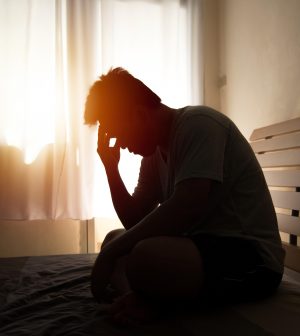- Could Your Grocery Store Meat Be Causing Recurring UTIs?
- Are You Making This Expensive Thermostat Error This Winter?
- Recognizing the Signs of Hypothyroidism
- 10 Strategies to Overcome Insomnia
- Could Artificial Sweeteners Be Aging the Brain Faster?
- Techniques for Soothing Your Nervous System
- Does the Water in Your House Smell Funny? Here’s Why
- Can a Daily Dose of Apple Cider Vinegar Actually Aid Weight Loss?
- 6 Health Beverages That Can Actually Spike Your Blood Sugar
- Treatment Options for Social Anxiety Disorder
Suicides Rise Again in the US, Increases Highest Among Minorities

MONDAY, Feb. 13, 2023 (HealthDay News) – Suicide rates have climbed again following a two-year decline, U.S. health officials report.
The new study from the U.S. Centers for Disease Control and Prevention also described a shift in demographics of those dying by suicide in 2021.
While rates among white Americans have been higher for decades than those among Black and Hispanic Americans, rates are now rising in minority populations. The report also noted that suicides are happening more often in younger minorities, compared to older white adults.
Communities most affected by the pandemic are where rates are rising, Dr. Sean Joe, a professor at the Brown School of Social Work at Washington University, told the New York Times.
“That’s what we’re unpacking at this point, is cumulative stress,” Joe said. “People couldn’t bury people the way they needed to bury them. They couldn’t grieve in the same way. You couldn’t gather in the same way, to cope with these losses. So, there’s a lot of unattended-to grief as well.”
The suicide rate among Black people increased by 19.2% between 2018 and 2021, from 7.3 to 8.7 per 100,000, and it climbed most quickly among Black people ages 10 to 24, at 36.6%.
That suicides are occurring at progressively younger ages in nonwhite people is troubling, Joe said.
“We tend to lose older generations of whites when it comes to suicide,” he said. “But among people of color, it’s always the young, not out of the fourth, third or even approaching the fifth decade of life.”
Suicide rates rose 5% overall in people ages 25 to 44, and by even more among Black, Hispanic, multiracial and Alaska Native people.
Native American and Alaska Native people continued to have high suicide rates, increasing by 26%, from 22.3 to 28.1 per 100,000.
For white people, the suicide rate actually dropped, from 18.1 to 17.4 per 100,000, a decline of 3.9%. White people still comprised the most suicides by sheer numbers, with 36,681 deaths reported, representing three-quarters of the total.
Suicide rates did decrease among older Americans ages 45 to 65, dropping 12.4% overall with drops among white, Hispanic and Asian people in that age group.
In 2021, there were a total of 48,183 suicides in the United States, close to the peak of 48,344 in 2018.
Financial stress, social isolation, substance use, barriers to health care and access to lethal means like firearms are among the factors that can lead to suicide, researcher Deborah Stone, lead behavioral scientist at CDC, told the Times.
Rates have dropped in the past during pandemics, wars and natural disasters, Dr. Christine Moutier, chief medical officer of the American Foundation for Suicide Prevention, told the Times.
Collective emergencies bring a “retrenching, with psychological girding and resilience and working against a common enemy,” Moutier explained. “That will wane, and then you will see rebounding in suicide rates. That is, in fact, what we feared would happen. And it has happened, at least in 2021.”
The “remarkable weakening of our mental health response system,” has made it extraordinarily challenging to get care for children and adolescents in crisis, Mitch Prinstein, chief science officer of the American Psychological Association, told the Times.
“It’s just become completely untenable,” he said. “We shouldn’t be surprised that some kids are experiencing a worsening of their symptoms to the point where suicide is more common.”
More information
Call or text 988 to reach the National Suicide Prevention Lifeline.
SOURCE: New York Times
Source: HealthDay
Copyright © 2026 HealthDay. All rights reserved.










